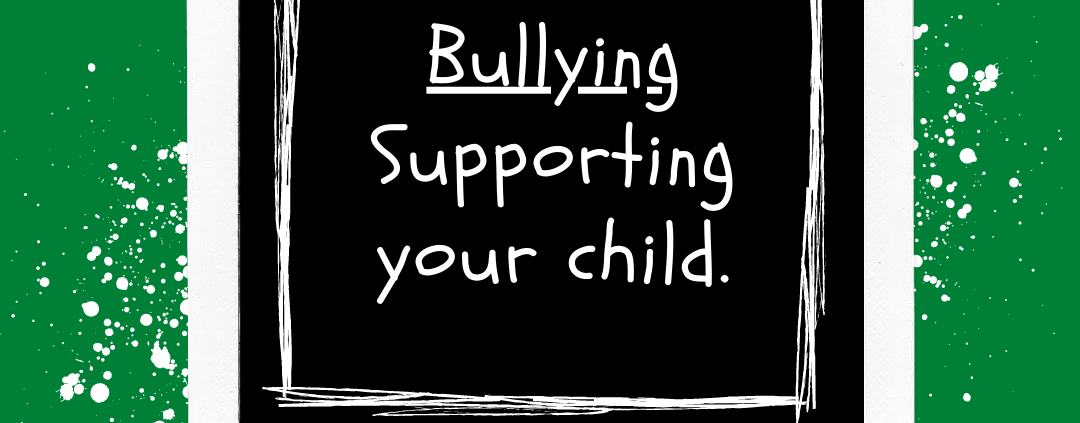Family Support Blog #9
Bullying
No parent likes to think about their child being bullied or, even worse, being a bully, but more than half of all children are involved either as bully, victim, or witness. So, there is a high probability you’ll have to deal with it at some point. If your child is being bullied there are things you can do to help them.
Listen and try not to get upset or angry. Put your own feelings aside, sit down and listen to what your child is telling you so you can give them the best support
Never tell your child to hit or shout names back. This doesn’t solve the problem and it may just make your child feel more stressed and anxious
Work together with the school and make it clear that you are seeking the school’s help in finding a solution

Supporting your child
- It is important to try and listen without getting angry or upset. Put your own feelings aside, sit down and listen to what your child is telling you. Reflect what you have heard by ‘playing back’ to them what you hear. You can ask them how they want you to take things forward, so they don’t feel excluded from deciding on next steps. Your child may fear reprisals if they report the bullying so they may need lots of support.
- Reassure your child it’s not their fault. Remind them that being bullied isn’t about being weak and that the person who is doing the bullying has the issues and that is why they feel the need to make others feel this way. Encourage your child to try to appear confident by helping them build resilienceas body language and tone of voice speak volumes.
- Sometimes people say nasty things because they want a certain reaction or to cause upset, so if your child gives them the impression they’re not bothered, the bullies are more likely to stop. Role-play bullying scenarios and practise your child’s responses. Talk about how our voices, bodies and faces send messages just the same way our words do.
- Don’t let the bullying dominate their life. Help your child develop skills in a new area. Encourage them to join a club or activity like drama or self-defence. This builds confidence, helps keep the problem in perspective and offers a chance to make new friends.
Things that may not help
- Don’t charge off demanding to see the head teacher, the bully, or their parents. This is usually the very reaction children dread and can cause bullying to get worse. Never tell your child to hit or shout names back. It simply doesn’t solve the problem and if your child is under-confident (and most bullied children are) then it just adds to their stress and anxiety.
- Never dismiss their experience, if your child has plucked up the courage to tell you about bullying, it’s crushing to be told to sort it out yourself or it’s all part of growing up. Don’t tell them to ignore it, as this can teach them that bullying has to be tolerated, rather than.
Dealing with your feelings

- You will feel a number of different feelings & emotions you find out your child is being bullied, upset, angry, helpless, guilty, hurt, or even scared. Think about how you feel before reacting otherwise you could make the situation worse, .
- Some children find it easier talking to their friends or other adults about the problem, don’t be upset by this just let them know that you are there for them. You may also find it easier to talk about it with your friends, being careful not to involve other parents that may know the children involved
Getting support from the school
- All schools are legally required to have an anti-bullying policy which provides guidance on their obligations and what support they can offer. Before you approach the school, list all the facts such as what happened, who was involved, when it occurred, who witnessed it and how often it has happened.
- Don’t arrive at the school unexpectedly, make an appointment with the class teacher or head of year. Aim to work together with the school and make it clear that you are seeking the school’s help in finding a solution.
- Avoid accusing the school and remember often teachers are usually the last to find out that bullying is happening at school. Be patient and allow the school time to deal with the problem but stay in touch with them and arrange a follow up meeting to see how the situation is being resolved.
What to do if things don’t improve

- Keep a diary and write down every incident as soon as possible after it happens. Include the date, what happened, who did it and who saw it. Include the effect on your child, whether your child told anyone and what they said or did and any later effects.
- Tell the school each time there is an incident. Write down what they say or do and any impact their actions have. If your child is hurt, take photographs, and see your doctor (and the police if the assault is serious). Schools have a variety of options for dealing with bullying. These range from a warning, seeing the bully’s parents and detention to internal exclusion within the school, fixed term exclusion and permanent exclusion.

If you’re not satisfied with the school’s response, don’t give up or be made to feel like a timewaster or a troublemaker. You can use our template lettersto write to the Head, Governors, Education Dept and Ofsted. If your child is too frightened or stressed to go, contact the LEA education welfare officer/social worker and ask them to intervene with the school.
Our Family Support Team are here to offer support and advice and are running workshops in your school throughout the year so please get in touch if you would like more information contact admin@chexs.co.uk
We are #hereforyou if you need advice, guidance or support – you can contact us via the contact information on our Team page.




